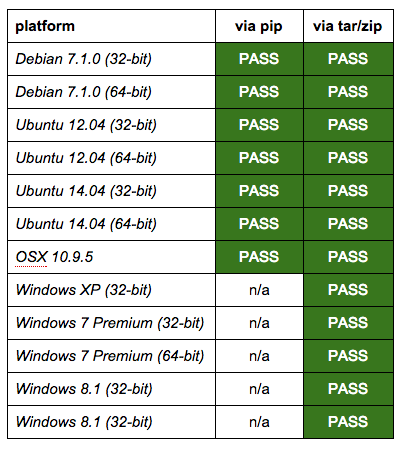A new testing framework has been released for fteproxy [1]. The goal of this framework is automate the process of testing fteproxy across a range of platforms and installation strategies
The testing framework validates fteproxy across 12 different platforms and two different installation strategies (via pip or via a tar/zip.) The following is a summary of the configuration used for each platform:
Debian/Ubuntu – Virtual machines were created with VirtualBox, controlled by vagrant, and shell scripts were created for each of the installation methods.
OSX – Licensing is difficult for OSX which makes it difficult to install on VirtualBox, etc. without substantial efforts. Parallels is the only VM that supports OSX as a guest — however, its scripting support is limited. Therefore, the host platform was used to do all pip tests in a virtualenv and all tar tests in a sandbox. This could be adapted to a VM in future.
Windows – VirtualBox images were created for each platform. Cygwin was installed with sshd and the default, insecure, vagrant public keys for SSH access. Vagrant boxes were then packaged, shell scripts were created to download the fteproxy zips from fteproxy.org and bat scripts were created to test the binaries.
The following table is a summary of results against fteproxy 0.2.18.
Future improvements: include testing for fteproxy’s deployment settings, such as Tor and automate the process of testing inter-version compatibility.
-Kevin
[1] https://github.com/kpdyer/fteproxy-tester
This work was made possible with a donation from NLnet foundation. Consider help funding the next stage of development of fteproxy with a donation.
